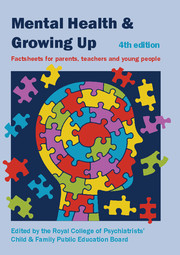Book contents
- Frontmatter
- Contents
- Contributors
- Factsheets for young people
- Factsheets for parents, carers and anyone who works with young people
- 1 Good parenting
- 2 The restless and excitable child
- 3 Dealing with tantrums
- 4 Children who soil or wet themselves
- 5 Sleep problems in childhood and adolescence
- 6 Behavioural problems and conduct disorder
- 7 Attention-deficit hyperactivity disorder (ADHD)
- 8 The child with general learning disability
- 9 Specific learning difficulties
- 10 Autism and Asperger syndrome
- 11 Depression in children
- 12 Worries and anxieties: helping children to cope
- 13 Divorce or separation of parents: the impact on children and adolescents
- 14 Death in the family: helping children to cope
- 15 The emotional cost of bullying
- 16 Traumatic stress in children
- 17 Domestic violence: its effects on children
- 18 Child abuse and neglect: the emotional effect
- 19 Drugs and alcohol: what parents need to know
- 20 Self-harm in young people
- 21 Psychosis
- 22 Schizophrenia
- 23 Bipolar disorder in children and adolescents
- 24 Obsessive–compulsive disorder in children and young people
- 25 Eating disorders in young people
- 26 Chronic physical illness: the effects on mental health
- 27 Medically unexplained physical symptoms
- 28 Chronic fatigue syndrome: helping your child get better
- 29 Parental mental illness: the problems for children
- 30 Who's who in CAMHS
1 - Good parenting
from Factsheets for parents, carers and anyone who works with young people
Published online by Cambridge University Press: 02 January 2018
- Frontmatter
- Contents
- Contributors
- Factsheets for young people
- Factsheets for parents, carers and anyone who works with young people
- 1 Good parenting
- 2 The restless and excitable child
- 3 Dealing with tantrums
- 4 Children who soil or wet themselves
- 5 Sleep problems in childhood and adolescence
- 6 Behavioural problems and conduct disorder
- 7 Attention-deficit hyperactivity disorder (ADHD)
- 8 The child with general learning disability
- 9 Specific learning difficulties
- 10 Autism and Asperger syndrome
- 11 Depression in children
- 12 Worries and anxieties: helping children to cope
- 13 Divorce or separation of parents: the impact on children and adolescents
- 14 Death in the family: helping children to cope
- 15 The emotional cost of bullying
- 16 Traumatic stress in children
- 17 Domestic violence: its effects on children
- 18 Child abuse and neglect: the emotional effect
- 19 Drugs and alcohol: what parents need to know
- 20 Self-harm in young people
- 21 Psychosis
- 22 Schizophrenia
- 23 Bipolar disorder in children and adolescents
- 24 Obsessive–compulsive disorder in children and young people
- 25 Eating disorders in young people
- 26 Chronic physical illness: the effects on mental health
- 27 Medically unexplained physical symptoms
- 28 Chronic fatigue syndrome: helping your child get better
- 29 Parental mental illness: the problems for children
- 30 Who's who in CAMHS
Summary
Why is parenting important?
Setting limits (rules) is an important part of everyday life. Rules make it possible for us to get along with one another. If children do not learn how to behave, they will find it difficult to get on, both with grown-ups and with other children. They will find it hard to learn at school, will misbehave and will probably become unhappy and frustrated.
What helps?
It is important to make sure that children feel secure, loved and valued, and that all adults looking after them notice when they are behaving well. The trick to this is to find strategies that work well for you and your child. Here are some ideas.
• Be consistent
Try to say the same thing each time. Be clear about the rules you want to stick to. If you don't stick to the rules and give in, then the next time you try to set limits, your child is likely to play up even more because they have learnt that you will probably give in again.
• Give lots of praise
Let your child know when they have done something well and when you are pleased with them. Be specific so that the child knows which behaviour you are wanting to encourage. For example, give them a hug or a kiss, tell them how great they are doing and point out the good behaviour. You need to do this straight away at the time when you see the behaviour you want to encourage.
• Plan ahead
It helps if you and your child know the rules for particular situations before they happen. Don't make them up as you go along (e.g. if bedtime is 7.00 pm, make sure you both stick to it).
• Involve your child
Sit down with your child and talk to them about good behaviour. You might be surprised about how much you both agree on.
• Be calm
This can be difficult in the heat of the moment, but it does help if you can be calm and clear with the words you use, for example ‘Please switch off the TV’ or ‘It's bedtime’.
- Type
- Chapter
- Information
- Mental Health and Growing UpFactsheets for Parents, Teachers and Young People, pp. 47 - 49Publisher: Royal College of PsychiatristsPrint publication year: 2013



